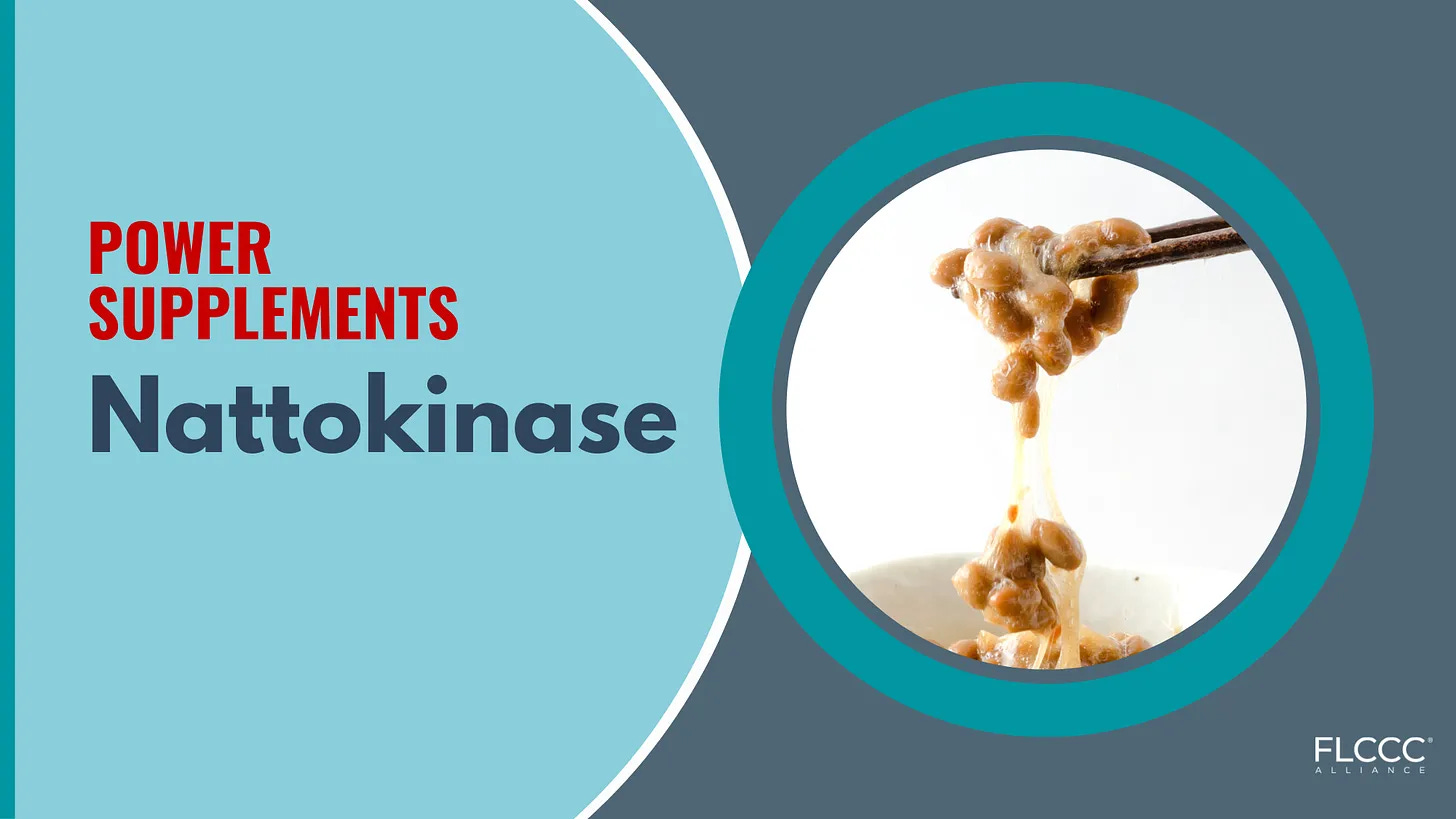Natto!
A multipurpose nutraceutical for the heart, cholesterol, atherosclerosis, blood pressure, spike protein
If you have long-COVID or long-haccine effects read this first:
30 Spike Protein Treatments (COVID+Vax/Hax)
Ivermectin, the SUPER drug
Treats 25 viruses, cancer, multiple sclerosis, SPS....
The FLCCC has the ultimate guide. They constantly update their recommendations based on the latest science.
This is a reprint from a recent article:
The story of nattokinase begins with a fermented soybean product called “natto” that the Japanese have consumed for centuries, with purported health benefits.
Turns out they were right — with many of the health benefits attributable to an enzyme found within called “nattokinase.”
Nattokinase has so many health benefits — particularly for the cardiovascular system — that I consider it a top 3 supplement every human being should be taking. (I take it everyday and even take it on vacations... I know, I’m a geek).
Reasons we love nattokinase:
1. It is good for your cholesterol levels
There are three main parts of your cholesterol panel: triglycerides, HDL, and LDL. As it turns out, nattokinase produces favorable changes in all three (triglycerides and LDL go down; HDL goes up). (Read more here)
Here is my favorite talk explaining cholesterol levels: watch here
Why is there so much controversy about cholesterol and heart disease? watch here
Challenging talk describing goal LDL targets: watch here
But even better….
2. Nattokinase can reverse atherosclerosis
People come to me all the time asking for anti-aging advice: You know what I tell them? The single most important anti-aging concept — ahead of hormones, ahead of cancer screening, ahead of any single exercise or diet — is the health of your blood vessels (aka “cardiovascular health”).
Why? Because cardiovascular health is responsible for 2 of the top 3 leading causes of death (heart attacks and strokes) and because the function of every other organ system in your body depends on a sufficient level of blood flow.
Atherosclerosis (aka “hardening of the arteries”) is the pathologic condition describing damage to the artery walls, progressive cholesterol and calcium deposition, inflammation, narrowing, and propensity for clotting.
Great video of atherosclerosis: click here
There are multiple factors that conspire to drive atherosclerosis (inflammation, high blood pressure, smoking, diabetes, lack of exercise, to name a few) but the most important of these is circulating cholesterol levels.
Here’s the million-dollar question: Can it be reversed? Once you have created arterial damage, can it resolve and heal? Or only be slowed?
Landmark intervention programs (including the Ornish method and Dr. Esselstyn’s program at Cleveland Clinic) have already answered that question. Now along comes nattokinase to contribute to the discussion — with surprising results like this study showing regression of atherosclerosis in the carotid artery superior to statin therapy.
3. It lowers blood pressure
Pop Quiz: What’s the single greatest risk factor for a stroke?
Answer: high blood pressure
4. Like aspirin, it thins the blood and also dissolves blood clots
Amazing… This is why it is being investigated in Japan for use with stroke victims.
Complete summary of Nattokinase for cardiovascular health: read here
And now, moving on to everyone’s least-favorite 5-letter word…
5. COVID: It dissolves spike protein and breaks down blood clots
By now I suspect you know how nasty the SARS-COV2 spike protein is — that it is not just the way the virus enters cells, but the main way the virus actually damages your body. (Thus, the vaccines are a disaster because their mRNA instructions tell your cells to create spike protein — of unknown quantity, for an unknown duration.)
One of the chief problems is that spike proteins promote blood clotting. So, what if we could take something that would directly dissolve spike protein on contact? And also dissolve any clots that have already formed?
Exactly. (read here)
6. COVID, part two: Nattokinase may help prevent infection
Since the spike protein is the mechanism for viral entry into your cells, and since nattokinase dissolves spike, it stands to reason it has a role in preventing infection.
In fact — voila! — this research showed exactly that: nattokinase effectively stopped SARS-CoV-2 infection of human cells in culture. (read here)
Postscript:
People also mention other fibrinolytic enzymes like serrapeptase or bromelain. These are definitely helpful as possible adjuncts or alternatives. So far, in my personal use and clinical practice, I have focused on nattokinase because I have found it to be the most extensively studied.
Make Natto at home without starter (better to use organic soybeans):
FLCCC Infographics/ Guides/ Learning Tools on Nattokinase:
https://covid19criticalcare.com/tools-and-guides/all-about-nattokinase/
https://covid19criticalcare.com/courses/long-story-short-with-dr-been/lessons/long-story-short-38/
https://covid19criticalcare.com/courses/long-story-short-with-dr-been/lessons/long-story-short-39/
https://covid19criticalcare.com/what-medicine-supplement-or-therapy-will-help-with-brain-fog/
https://covid19criticalcare.com/reducing-cardiac-risk-after-covid-19-vaccination/
A guest post by: Michael Turner M.D.
Dr. Turner is a graduate of Stanford University, Harvard Medical School and The Mayo Clinic. He is an Integrative Medicine physician and CEO of his own national, concierge practice.
NEVER lose hope. There’s always a solution for everything:


Is atherosclerosis caused by high cholesterol?
U. Ravnskov QJM: An International Journal of Medicine, Volume 95, Issue 6, June 2002, Pages 397–403, https://doi.org/10.1093/qjmed/95.6.397
See these sections in the paper
-Cholesterol does not predict degree of atherosclerosis at autopsy
-Cholesterol does not correlate with degree of coronary atherosclerosis on angiography
-Cholesterol does not correlate with degree of coronary calcification
-Cholesterol does not correlate with degree of peripheral atherosclerosis
Natto comes from the earth, somewhere. Ivermectin comes from earth, somewhere. They both seem to stop the badness. Anyone see a similarity?